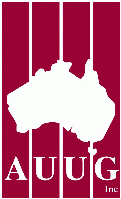 Australian Open Source Symposium 4
Australian Open Source Symposium 4Register Now
 Australian Open Source Symposium 4
Australian Open Source Symposium 4
Register Now
The fourth Australian Open Source Symposium (AOSS 4) will be held in Sydney on Saturday, 20 July 2002. AOSS is an annual gathering of the Australian Open Source community.
AOSS is run by developers, for developers, but other members of the IT community are welcome and will benefit from the ``hands-on'' atmosphere. Our goals are to promote the sharing of information and experience, to give the community a place to interact, and to nurture and harness synergies between Open Source projects.
Just as Open Source is a little different, so is AOSS. The majority of the presenters are actively involved in Open Source development. With few exceptions, they talk about work that they have done, or work which is currently in progress. The majority of the developers are local residents, demonstrating that Open Source is a global phenomenon.
Previous AOSS events were resounding successes. We expect this one to be even better.
The fourth AUUG conference discussing the state of the art in Open Source systems development, presented primarily by people actively engaged in Open Source software development.
Saturday, 20 July 2002, 8:30 am to 5:30 pm.Where:
Level 1, Building K17, CSE (School of Computer Science and Engineering)Target audience:
University of New South Wales
SydneyA map and location details are available. Building K17 is at K17 on the grid on this map, which calls it ``Geography and Surveying''.
IT professionals, software developers.Organizer:
The Australian UNIX User Group (AUUG).Cost:
Symposium costs include registration, morning tea, lunch and afternoon tea:
Members: $60 Non-members: $100 Student members $30 Student non-members $50 Membership rates apply to members of AUUG, BUGS, SLUG, ISOC-AU and SAGE-AU.
Save money by becoming a member of AUUG! Annual membership costs $110 for full members and $27.50 for students.
Registration9:00 - 9:15
Welcome and Introduction9:15 - 9:45
Serel9:45 - 10:15
Leni MayoSerel adds synchronisation and integrity-checking to the operating system "service startup" phase, allowing a computer's services to start in parallel. Without parallelism, "service startup" is typically the most time-consuming part of the boot process.
rdesktop10:15 - 10:45
Matt Chapmanrdesktop is an open source client for Windows Terminal Services, capable of speaking Microsoft's proprietary Remote Desktop Protocol (RDP).
Bitkeeper10:45 - 11:15
Peter ChubbCome and find out what Peter Chubb means by his current sig, "You are lost in a maze of BitKeeper repositories, all almost the same.", as he talks his experience with BitKeeper as he works on the Linux source code.
Morning Tea11:15 - 12:00
The Trivial Database Replication System12:00 - 12:45
Liam WiddowsonThe Trivial Database Replication System is an open source database engine that allows UNIX systems to utilise a distributed, replicated, peer-to-peer DBM style database.
In this paper, Liam describes the initial design goals and the internal architecture of the software. The database access API will also be discussed. Additionally, a case study will be used to demonstrate possible applications.
The libsndfile test suite.12:45 - 1:30
Erik de Castro LopoErik will talk about the ideas behind, the implications of and the implementation of libsndfile's test suite as well as giving a very brief introduction to autogen.
Lunch1:30 - 2:30
distcc2:30 - 3:00
Martin Pool, HPdistcc is a program which speeds up software builds by distributing the build across multiple machines.
Big Blue Penguins3:00 - 3:30
Martin SchwenkeIBM and open source sound like non-overlapping spaces. Martin works with IBM's Linux Technology Center in Canberra and tells us what it's like inside.
Afternoon Tea4:00 - 4:30
Large page support in the Linux kernel4:30 - 5:00
Lucy Chubb, Gelato projectThe IA64 hardware currently provides support for page sizes of up to 256MB, but there is limited support to use any of this capability within Linux. Tests with other hardware/operating system combinations have shown that there is potential for significant speedups by using large pages, which reduce the cost of TLB miss processing. Lucy will talk about the work in progress within the UNSW Gelato project to implement superpages in IA64 Linux.
Testing? What testing?5:00 - 5:30
Peter MillerThis talk presents a simplistic yet powerful model of what a test is. When you intend to test your software, you have to design your software to be testABLE. The talk will examine attributes of software implied by this model. Some examples of automated testing will be given.
SwapBox
Duraid MadinaSwapBox is a network-attached storage device optimized to act as high performance swap space.
The speakers, topics and times are correct at the time of publishing. In the event of unforeseen circumstances, AUUG Inc. reserves the right to alter or delete items from the Programme.
Each Delegate named herein, or their later substitute, accepts that AUUG Inc, their agents, speakers, chairmen, secretariat or any other persons (`the parties'') involved in the preparation of this pamphlet or in the planning or presentation of this event, do not accept any contractual, tortious or other form of liability for loss or damage suffered by the delegate or their later substitute relying on any statement representation advice or opinion (whether true or otherwise, written or oral) and whether due to the negligence of any of the said parties by this disclaimer of liability to exclude liability, if any, for such statement representation advice or opinion, and that the said party may rely on this disclaimer of liability in the event of any demand claim suit or action brought against any or all of them arising out of any statement representation advice or opinion. The authors have prepared this material for Professional Development purposes. Although they trust that it will be useful for this purpose, neither the authors nor AUUG Inc can warrant that the use of this material, would be adequate to discharge the legal or professional liability of members in the conduct of their practices. AUUG Inc reserves the right to cancel the event.
AUUG Home Site Map Email comment